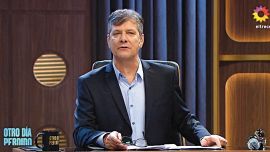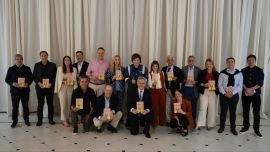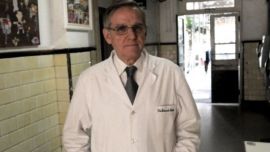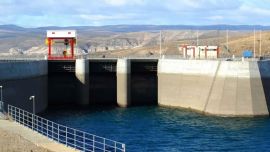Mirtha Legrand's TV programme last weekend had two featured interviewees: President Javier Milei, the star guest, and one of his Cabinet officials ministers: Security Minister Patricia Bullrich.
The president’s first two weeks inside the Casa Rosada led him to take a strategic decision: to strongly empower Bullrich so that she can take centre stage in security matters, a central axis of the libertarian administration, and, at the same time, become one of the few spokespersons for all the decisions taken by the Executive.
In this context, it was Milei himself who decided that Bullrich should accompany him to Mirtha Legrand's "mesaza" for the television programme. He has set her up as a clear spokesperson for the government's vision.
With her usual high profile, Bullrich defended President Milei’s measures, from his decree of necessity and urgency to his economic policy. That is to say, she has commented beyond her particular remit of security minister.
A foretaste of this occurred on Wednesday, December 20. The most important date so far of Milei's administration. The President made two key gestures with Bullrich in mind: first, he sat the security minister at his side when he announced his sweeping presidential decree in a nationwide address; second, he took her with him (along with his sister Karina Milei) to the security monitoring centre to observe how her ‘anti-picket’ protocol for demonstrations was working out.
That same day, hours after the mobilisation, via social networks, the head of state congratulated Bullrich and Human Capital Minister Sandra Pettovello for how the protest was resolved – without injuries and with few roadblocks.
In the eyes of her close friends, Bullrich is happy with her renewed role in the new government. Not only because she has returned to a portfolio she knows well – albeit with a younger, fresher team – but also because she feels she is "freer" than ever to say what she believes in.
In the four years of Mauricio Macri's Presidency, that wasn’t always the case – she always had a counterbalance in and a dispute with (especially after the Santiago Maldonado case) then-Cabinet chief Marcos Peña. Today she does not see such resistance. Perhaps Milei's political incorrectness has been a common point with Bullrich throughout the campaign.
Within the PRO party, they have begun to make another, more profound, reading of the President's attitude towards his minister. One of Bullrich's historic supporters put it bluntly: "He is using her to balance the weight of Mauricio [Macri]."
The truth is that when it comes to the Casa Rosada, Cabinet Chief Nicolás Posse has an eminently technical profile. Along with Bullrich, the other political official who acts as spokesperson is the Interior Minister Guillermo Francos.
In this context, Bullrich recently criticised the PRO leaders who came out to reject Milei’s presidential DNU. "They supported Macri issuing decrees and, now they don't… be coherent. The country is in an emergency," she said in a radio interview, delivering a message that seemed to be aimed directly at Horacio Rodríguez Larreta.
"Emergency is a concept; every day we Argentines see prices rising, every day we have less purchasing power. We are working to improve the living situation of every Argentine and in a few months, we will put an end to inflation, there will be better jobs and better opportunities," she said.
"During two years of campaigning, we discussed whether shock or gradualism [was the way forward], and we all said 'shock.’ Milei said ‘shock,’ I also said ‘shock’ and I won the PASO [primary] in Juntos por el Cambio so that the country can move forward," she argued.
"What are we going to do? Are we going to wait for the times to eat away at the government's confidence? Or are we going to go in with all our strength, with all our determination?" she wondered rhetorically.
“Milei is leading them on with determination. Today the people are supporting him, and there are 'intense minorities' who would have done the same," Bullrich concluded.





















Comments